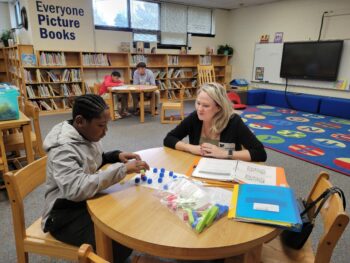Theory of Change
Heart Math Tutoring (“HMT”) is the link between a huge, untapped pool of volunteers and the thousands of students who need one-on-one academic supports.
Students
- Only 39% of fourth graders in the U.S. are proficient in elementary math (2024 NAEP)
- Many will fall further behind because of poor number sense
- All can succeed with one-on-one, targeted instruction
Volunteers
- Large, untapped pool of community members
- Willing to help but need tools and support
- Have limited time, and quality of past tutoring experiences may be varied
An Urgent Need
Our community is missing out on significant potential when only 39% of fourth graders in the United States are proficient in math (2024 NAEP). Without intervention, scores tend to decline between 4th and 8th grade, as course difficulty increases. This is often a sign that students relied too heavily on memorized math facts in early years rather than understanding how numbers work. Math proficiency is critical for academic confidence, high school graduation, and post secondary and career options. All students can learn to understand numbers with targeted, hands-on practice, but teachers have limited capacity to give students one-on-one attention and not all families can afford private tutoring.
A Powerful Resource
Volunteer time is one of the only resources available to public schools that is not yet fully leveraged. HMT connects students with one-on-one, volunteer-delivered tutoring during the school day, free of charge to families. HMT’s activity-based, structured curriculum and on-site staff support enables volunteers to be effective with a commitment of one hour per week and minimizes day-to-day work for school staff.
A Greater Impact
Success in math is an important piece of the equation for opportunity and economic mobility. Research shows that school-entry math skills impact later academic skills not only in math, but also in literacy (Greg Duncan et.al, 2007)! Elementary math proficiency matters for a student’s self-identity as a successful student, middle school preparedness, high school graduation, and postsecondary and career options. 75% of U.S. jobs require a high school diploma (U.S. BLS, 2015), and 75% of the fastest growing occupations require significant math or science preparation (AdeccoUSA, 2016).
When young students have successful experiences in math, they are also building important lifelong skills:
- Perseverance
- Problem-solving
- Critical thinking
- Confidence
- Purpose
Why Math Tutoring?
Many students who are already falling behind in elementary school math have not developed “number sense” – a conceptual understanding of how numbers work. Instead, students rely on memorized rules and procedures without a deep understanding of what they are doing and why, leaving them unprepared for higher levels of math.
Place Value:“Can you show me what the ‘1’ in ‘16’ means?” |
Equality:8 + 4 = [ ] + 5 |
Place Value:A number contains 18 tens, 2 hundreds, and 4 ones. What is that number? |
| Half of 3rd graders in the study could not explain this.
|
Only 2% of 6th graders responded with the correct answer.
|
50% of 5,000 middle school students could answer this task correctly.
|
Students benefit from targeted intervention:
“The kind of mathematical thinking that can provide a foundation for learning algebra must be developed over an extended period of time, starting in the early elementary grades.” Carpenter, Franke, Levi, Integrating Arithmetic and Algebra in Elementary School
Number sense, or numeracy, can be developed through targeted, hands-on experiences with numbers! (Results)
Teachers do all they can but have limited capacity to provide one-on-one attention to students, and not all families can afford the cost of private tutoring. In response, HMT connects students with one-on-one volunteer-delivered tutoring during the school day, free of charge to families. HMT’s activity-based, structured curriculum and real-time staff support enables volunteers to be successful with a commitment of one hour per week and minimizes day-to-day work for school staff.
Equity as a strategy:
HMT’s mission and math strategies apply to all students, but we strategically focus first on students who may not have access to resources for private tutoring. Over 90% of Heart Math Tutoring students are people of color, reflecting the demographic makeup of high-poverty concentration schools in Charlotte-Mecklenburg Schools (CMS) and the barriers to wealth generation people of color have faced in the United States (sources – CMS Breaking the Link report and Center for American Progress). While math skills and confidence play a tremendous role in unlocking opportunity in HMT students’ lives, we know our students are also impacted by issues of race. The HMT board and staff are committed to engaging in dialogue and training on issues of racial equity and to ensuring that our students experience empathy, compassion, and empowerment in the program. Read more from our team here and here.



